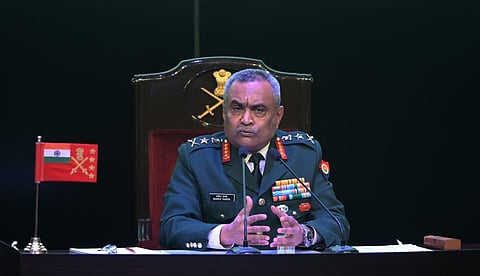

NEW DELHI: The Indian Army's Chief of Staff Gen Manoj Pande on Thursday described the situation along the northern border with China as 'stable' but 'sensitive'. In an interaction with the media, he also spoke about the situation with Pakistan, Myanmar and even Bhutan.
"The situation on the northern border is stable but sensitive. We continue to talk to find a solution to address and balance issues between the two sides. Operational preparedness is very high and deployment is both robust and balanced," said Gen Pande during his annual press conference before the Army Day on January 15.
India has been asking for status-quo ante to the mid-2020 position on the ground in Eastern Ladakh and has asked China to move its troops back from the Depsang Plains and the Demchok area. The 20 rounds of Corps Commanders talks have led to disengagement at Galwan (Patrolling Point 14), North and South banks of Pangong Tso, Gogra (PP 17A) and Hot Springs (PP 15). In addition, there have been multiple diplomatic parlays between the two countries. The troops have moved back from the earlier eye-to-eye deployment from the standoff points to new locations but they remain in the area.
The Indian Army Chief emphasized that once status quo ante to mid-2020 is achieved, "Maybe then we will talk of troop reduction. Till that time, whatever forces are required we will keep them deployed along the borders."
"As far as the situation in Jammu and Kashmir is concerned, the ceasefire understanding along the LoC continues to hold. Even though we see infiltration attempts, which we have been able to thwart... We have a strong anti-drone mechanism in place to stop the use of drones to smuggle weapons and narcotics.... The area of Rajouri Poonch has seen increased terrorist activities. Support infrastructure for proxy tandems in the Rajouri Poonch sector from across the border continues," Gen Pande added.
The Indian Army will keep working towards strengthening its intelligence gathering using human and technical means as well as working with other agencies including the local police, he said.
On Manipur, Gen Pande said the state has witnessed violence since May last year. "With the combined efforts of the state govt, Army, Assam Rifles and other agencies, we've been able to stabilise the situation to a large extent," he said.
On military modernisation, he said that niche technologies including disruptive ones are being inducted.
Referring to organisational reforms, Pande spoke about rightsizing (bringing down) the total number of personnel, "We have restructured our artillery unit. We also have restructured units of electronic warfare and electronic intelligence. We have started the process of reducing animals in our animal transport units and they are being replaced by drones...We have made a plan and optimised our strength by significant numbers and by 2027 we will achieve an optimisation of 1 lakh numbers. We have given the proposal to the government," he added.
The rightsizing by about a lakh personnel will be completed by 2027, he said. The current strength of the Army is about 1.2 million personnel. Multiple studies in recent years have recommended decreasing the overall personnel count with the aim of better teeth (combat) to tail (logistics and support troops) ratio.
Coming to the rising incidents along the Line of Control and specifically the Rajouri-Poonch sector, he said this is an area where our adversary is active in abetting terrorism.
On the question of talks between Bhutan and China to resolve their boundary dispute, Gen Pande said developments having a bearing on India's security are being monitored. "We have robust military engagement with Bhutan and are closely monitoring developments," he said.
The Army Chief described the situation along the Indo-Myanmar border as a matter of concern. India shares a 1643-km border with Myanmar running along Arunachal Pradesh, Nagaland, Manipur and Mizoram. Any developments in that country have a direct impact on India's bordering regions. Violence has gripped Manipur, sharing around 390 km border with Myanmar.
On the issue of Agniveers, he said that their integration into the Army is moving forward well.
The Army Chief also said that 2024 will be the year of technology adoption for the Indian Army as part of overall modernisation of the force.